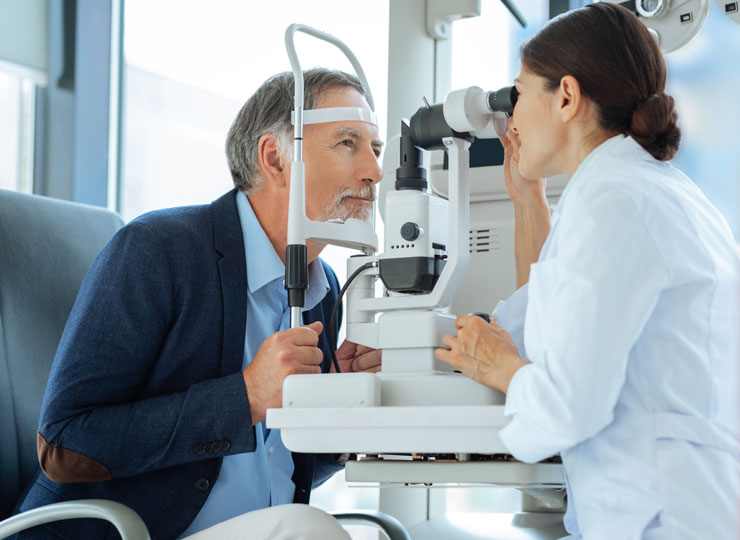
August 9, 2023
Good vision may be one important factor for good brain health, according to a new report. The findings build on mounting evidence that poor vision increases the risk of developing Alzheimer’s disease and other forms of dementia, and underscore the importance of getting regular eye exams to help maintain cognitive health as we age.
For the study, researchers at the Kellogg Eye Center at Michigan Medicine in Ann Arbor looked at nearly 3,000 men and women in their 70s and older. All had vision tests to check their near and distant vision, as well as their ability to distinguish letters against backgrounds of varying contrast.
Participants also underwent tests of thinking and memory skills, and researchers reviewed their medical records. The researchers found that the poorer their vision, the higher their risk of dementia. Those with poor vision included those who weren’t able to see well even when they were wearing glasses or contact lenses. The findings were published in JAMA Ophthalmology.
About 12 percent of the study participants overall had been given a diagnosis of Alzheimer’s disease or other form of dementia. This rose to nearly 22 percent among those who scored low on tests of near vision, or the ability to read up close. About a third of those with moderate to severe distance vision had signs of dementia, as did 26 percent of those who couldn’t see letters that didn’t contrast sharply against a background. Those who had only mild problems with distant vision did not have a higher dementia risk.
The study showed only a correlation between vision and dementia and could not prove that poor vision actually caused deterioration of brain health. But many earlier studies have shown a link between poor vision and an increased risk of dementia.
Visual impairments that make it difficult to read or work at the computer, for instance, may limit one’s time doing these activities. Earlier studies have found that both activities may lower your dementia risk.
Poor vision, like poor hearing, is a form of sensory deprivation, in which the brain gets only limited stimulation. Stimulation of the brain, whether it’s through the senses or through cognitively stimulating activities like reading a newspaper or doing crossword puzzles, has been linked to a lower risk of dementia.
Poor vision may also limit a person’s ability to drive or get out of the house and socialize with others. Social interaction has been shown in many studies to be a key component of healthy aging. Poor vision may also limit physical activity, which has been tied to better brain health.
“Equitable access to vision care services that prevent, reverse, or at least stave off progression of loss of sight is a worthy goal,” said Sheila West of the Wilmer Eye Institute at Johns Hopkins Medicine, who wrote an editorial accompanying the Michigan study. Regular vision checks “may be especially critical for those experiencing cognitive decline,” she wrote.
Last year, in a report funded by the National Institute on Aging, some of the same authors concluded that as many as 100,000 cases of Alzheimer’s disease and other forms of dementia could have been better managed or even perhaps delayed with better eye care. Identifying and correcting vision problems through such methods as regular eye exams, corrective eyeglasses or contact lenses, and cataract surgery could go a long way in helping to prevent or delay the onset of Alzheimer’s and related dementias, they wrote.
About 80 percent of vision impairment occurs in adults aged 50 and older, and 90 percent of cases are preventable or have yet to be treated. One of the most common causes of blurry vision in older adults is cataracts, which result from the gradual clouding of the normally clear lens of the eye. Eye diseases like glaucoma, macular degeneration and diabetes-related retinopathy are also common in older people. Regular eye exams can help to identify these problems early, and effective treatments to limit vision loss are available for many of these eye problems.
The American Academy of Ophthalmology recommends that all adults who are healthy and with good vision should have a complete eye exam at least once in their 20s and twice in their 30s, increasing to up to every year or two at age 65 or older. If you wear contact lenses, see your eye doctor every year. If you have diabetes or high blood pressure or have a family history of eye disease, you may need to see the eye doctor more often. If you have symptoms like sudden vision loss or see flashing lights, call your eye doctor immediately. Your ophthalmologist can advise you on how often your eyes should be examined.
Regular vision checks are also important for those who already have Alzheimer’s disease. Earlier studies have shown that one in three nursing home residents with Alzheimer’s disease who need eyeglasses don’t have the right glasses and can’t see clearly. Poorly corrected vision may mean they are missing out on mentally stimulating activities that may help to ease aggravation and soothe symptoms of dementia.
Experts recommend that if you care for someone with Alzheimer’s disease, a few simple steps can help avoid vision-related problems. These include labeling eyeglasses with a person’s name and phone number so that if they are lost they can be more easily recovered; if possible having a spare pair of glasses on hand; and scheduling regular eye exams ahead of time to make sure vision prescriptions are up to date.
By ALZinfo.org, The Alzheimer’s Information Site. Reviewed by Eric Schmidt, Ph.D. Fisher Center for Alzheimer’s Research Foundation at The Rockefeller University.
Source: Olivia J. Killeen, MD, MS; Yunshu Zhou, MS; Joshua R. Ehrlich, MD, MPH: “Objectively Measured Visual Impairment and Dementia Prevalence in Older Adults in the US.” JAMA Ophthalmology, July 13, 2023.











